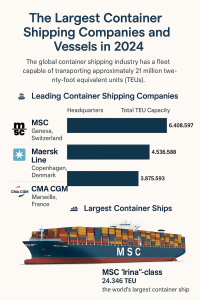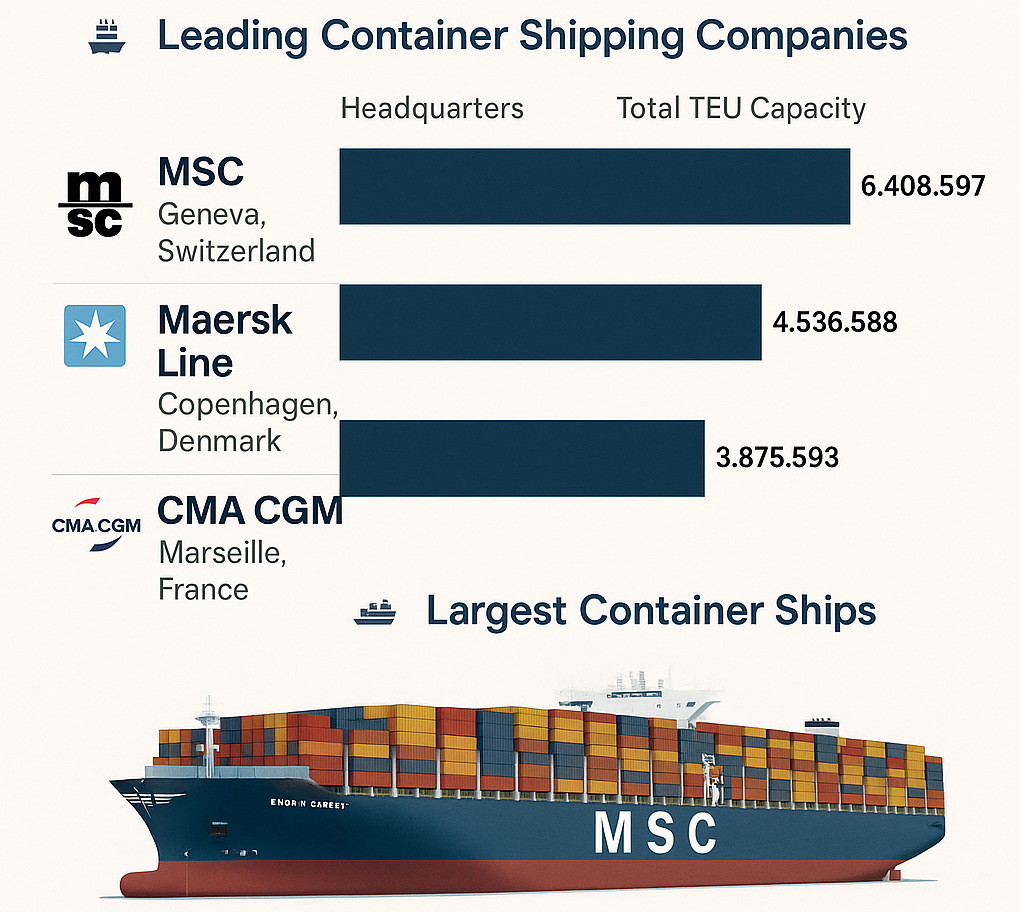The global container shipping industry is a cornerstone of international trade, with a fleet capable of transporting approximately 21 million twenty-foot equivalent units (TEUs) across the world’s oceans. As of March 2025, the industry comprises around 6,000 active vessels, facilitating the movement of goods on a massive scale.
Container shipping rates are surging due to increased demand, port congestion, and geopolitical tensions, impacting global supply chains. With capacity constraints and rising fuel costs, businesses face higher logistics expenses, leading to potential price hikes for consumers. Experts suggest booking shipments early and exploring alternative routes to mitigate delays. Stay updated on market trends to navigate these challenges effectively.
🚢 Leading Container Shipping Companies
According to Alphaliner’s data from March 2025, the top container shipping companies by fleet capacity are:
-
Mediterranean Shipping Company (MSC)
-
Headquarters: Geneva, Switzerland
-
Fleet: 889 ships
-
Total TEU Capacity: 6,408,597
-
Market Share: 20.2%
-
-
Maersk Line
-
Headquarters: Copenhagen, Denmark
-
Fleet: 735 ships
-
Total TEU Capacity: 4,536,588
-
Market Share: 14.3%
-
-
CMA CGM
-
Headquarters: Marseille, France
-
Fleet: 664 ships
-
Total TEU Capacity: 3,875,593
-
Market Share: 12.7%
-

-
COSCO Shipping Lines
-
Headquarters: Shanghai, China
-
Fleet: 508 ships
-
Total TEU Capacity: 3,279,936
-
Market Share: 10.7%
-
COSCO operates a vast network, including subsidiaries like OOCL and Shanghai Pan Asia Shipping, enhancing its global reach. AXSMarine
-
-
Hapag-Lloyd
-
Headquarters: Hamburg, Germany
-
Fleet: 292 ships
-
Total TEU Capacity: 2,249,765
-
Market Share: 7.3%
-
Hapag-Lloyd has strengthened its position through strategic alliances and fleet modernization efforts.
-
-
Ocean Network Express (ONE)
-
Headquarters: Tokyo, Japan
-
Fleet: 246 ships
-
Total TEU Capacity: 1,938,647
-
Market Share: 6.3%
-
Formed through the merger of MOL, “K” Line, and NYK, ONE focuses on enhancing service quality and operational efficiency.
-
-
Evergreen Marine Corporation
-
Headquarters: Taoyuan City, Taiwan
-
Fleet: 220 ships
-
Total TEU Capacity: 1,712,161
-
Market Share: 5.5%
-
Evergreen is known for operating some of the world’s largest container ships and continues to expand its fleet.
-
-
Hyundai Merchant Marine (HMM)
-
Headquarters: Seoul, South Korea
-
Fleet: 75 ships
-
Total TEU Capacity: 820,000
-
Market Share: 2.6%
-
HMM plays a pivotal role in South Korea’s maritime industry, focusing on expanding its global service network.
-
-
Yang Ming Marine Transport Corporation
-
Headquarters: Keelung, Taiwan
-
Fleet: 90 ships
-
Total TEU Capacity: 662,000
-
Market Share: 2.1%
-
Yang Ming offers comprehensive services across Asia, Europe, America, and Australia, emphasizing reliability and efficiency.
-
-
Wan Hai Lines
-
Headquarters: Taipei, Taiwan
-
Fleet: 146 ships
-
Total TEU Capacity: 430,000
-
Market Share: 1.4%
-
Wan Hai specializes in intra-Asia routes and has been expanding its services to other regions.
-
-
Pacific International Lines (PIL)
-
Headquarters: Singapore
-
Fleet: 135 ships
-
Total TEU Capacity: 383,016
-
Market Share: 1.2%
-
PIL has shown significant growth, increasing its fleet size by nearly 30% year-on-year, driven by the delivery of several LNG-powered post-Panamax vessels.
-
12.IRISL (Islamic Republic of Iran Shipping Lines)
-
-
-
Headquarters:Tehran, Iran
-
Fleet: 115 ships
-
Total TEU Capacity: 400,000
-
Market Share: 1.2%
-
PIL has shown significant growth, increasing its fleet size by nearly 30% year-on-year, driven by the delivery of several LNG-powered post-Panamax vessels.
-
-
🛳️ Largest Container Ships
The title of the world’s largest container ship is currently held by MSC’s Irina-class, boasting a capacity of 24,346 TEUs. This surpasses the previous record set by MSC’s Tessa-class vessels, which have a capacity of 24,116 TEUs. These ultra-large container ships (ULCS) exemplify the industry’s push towards economies of scale.
🌐 Industry Trends and Outlook
The container shipping industry has experienced significant growth, with shipowners placing record orders for new vessels. As of late 2024, the total capacity of container ships on order reached 8.4 million TEUs, the highest level since 2000. This surge is driven by increased profits and a desire to modernize fleets. However, analysts warn of potential overcapacity, especially if global trade slows or if geopolitical tensions affect shipping routes(Financial Times).
⚓ Conclusion
The container shipping industry continues to evolve, with companies like MSC and Maersk leading in fleet capacity and innovation. The introduction of ultra-large container ships reflects the industry’s focus on efficiency and scale. However, the balance between fleet expansion and global trade demand remains a critical factor for sustainable growth.


It is really a nice and helpful piece of info. I am glad that you shared this helpful information with us. Please keep us informed like this. Thanks for sharing.
Howdy! Someone in my Facebook group shared this site with us so I came to check it out. I’m definitely enjoying the information. I’m book-marking and will be tweeting this to my followers! Fantastic blog and fantastic design.